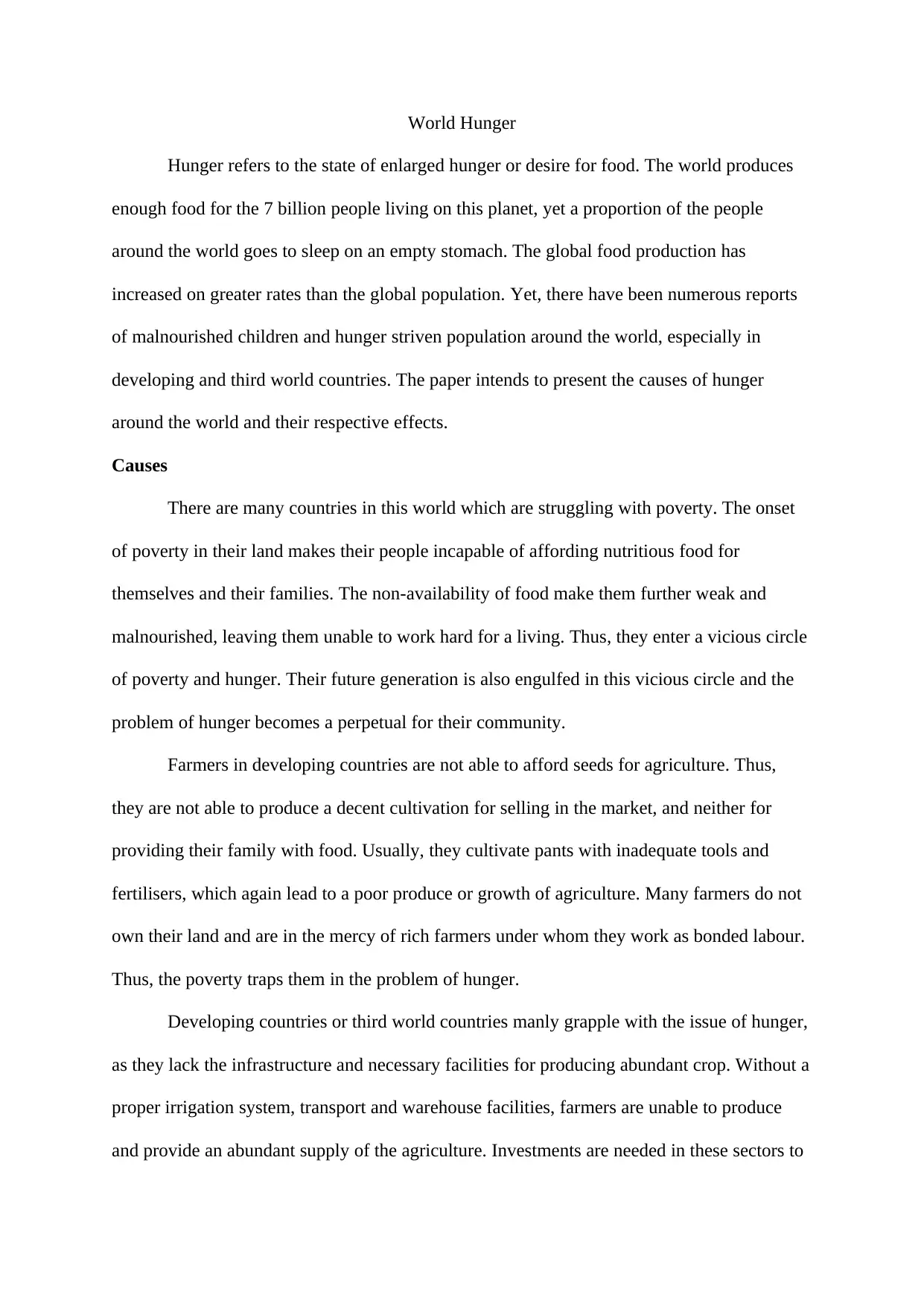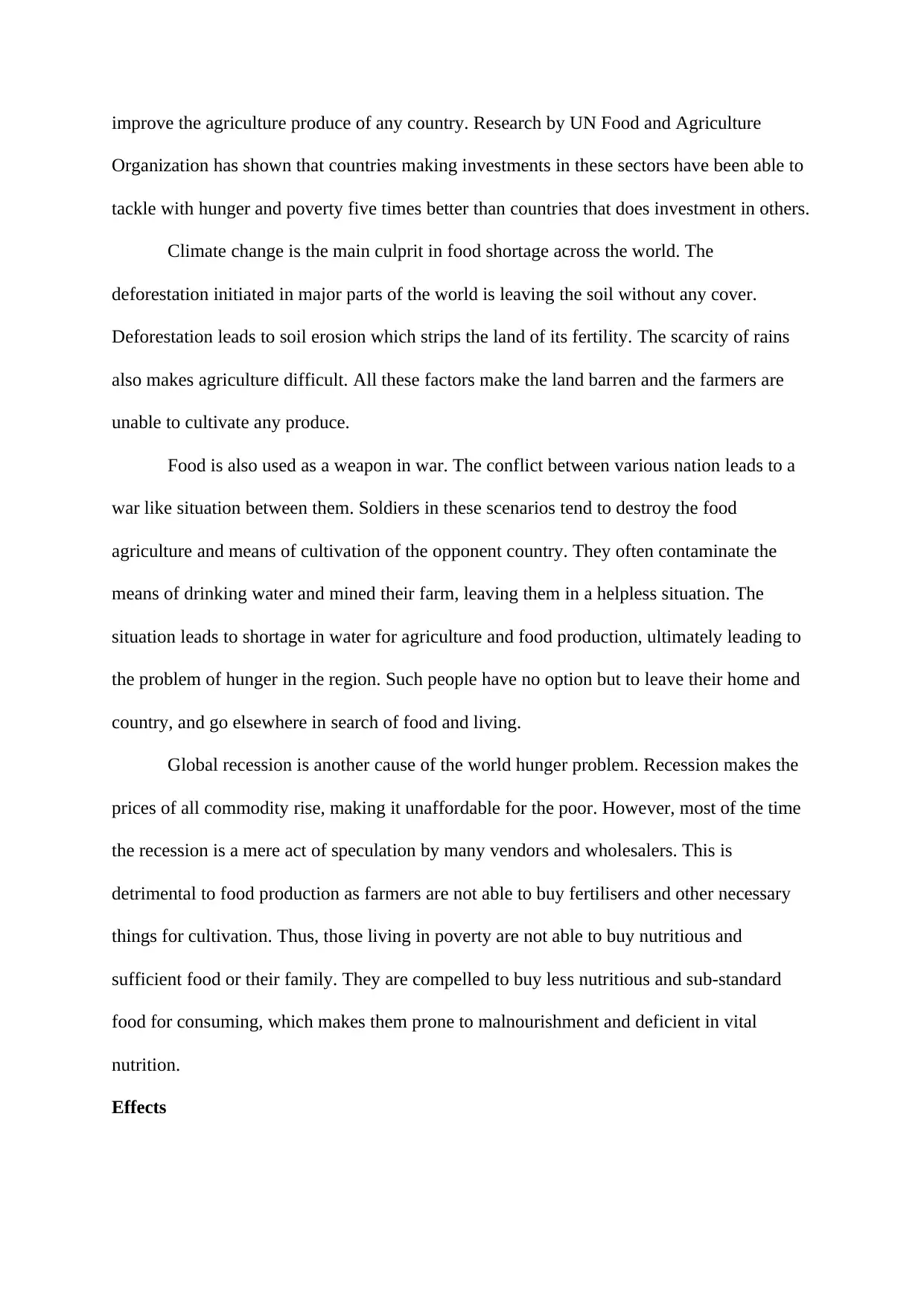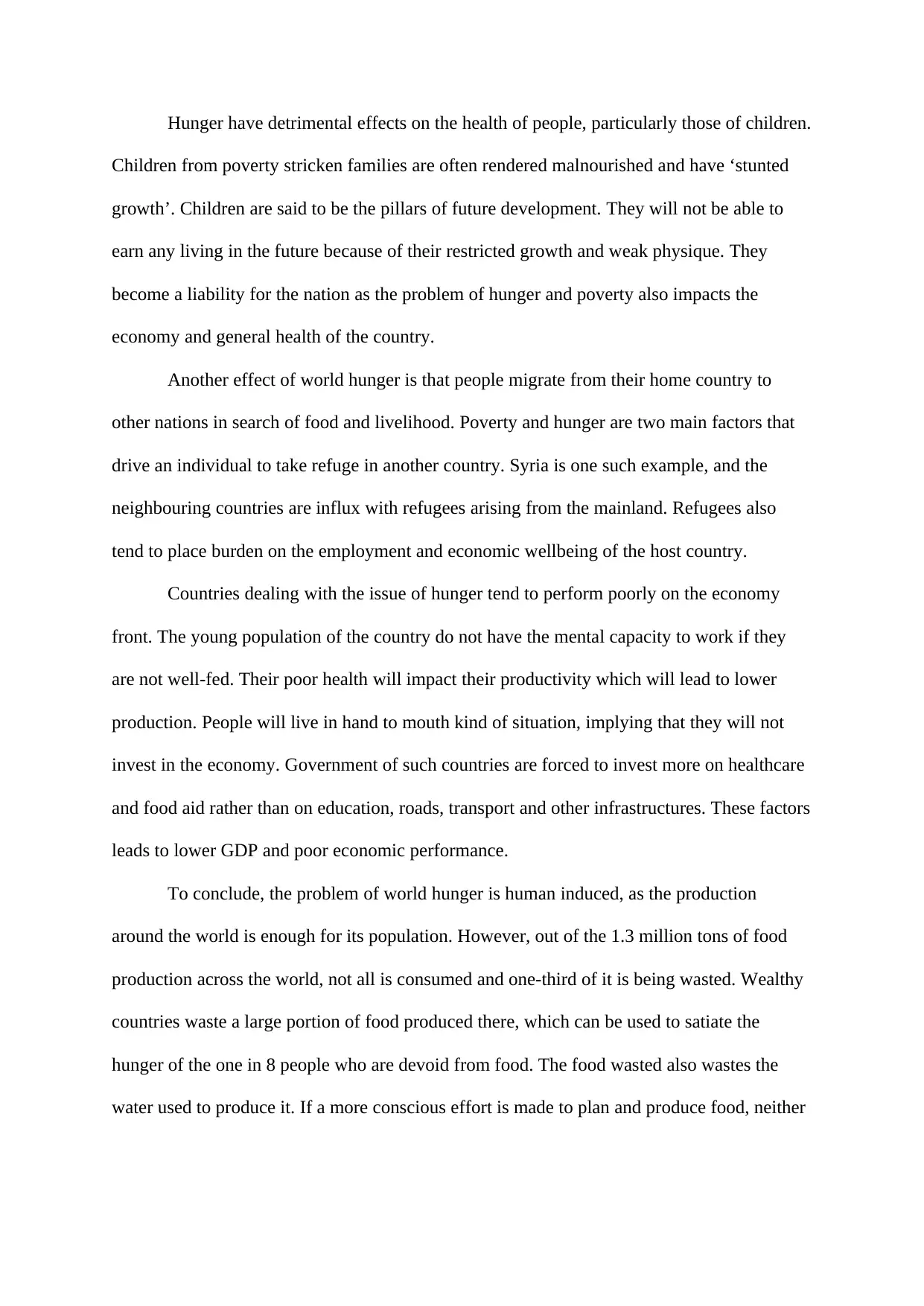World Hunger: Examining Causes, Effects, and Potential Solutions
VerifiedAdded on 2022/10/15
|4
|1088
|28
Essay
AI Summary
This essay delves into the multifaceted issue of world hunger, examining its primary causes and detrimental effects on a global scale. It highlights poverty, lack of agricultural resources, climate change, and conflict as key drivers of food insecurity. The essay further explores the consequences of hunger, including malnutrition, stunted growth in children, migration, and economic decline. It emphasizes the human-induced nature of the problem, pointing out that despite sufficient global food production, significant waste and unequal distribution contribute to widespread hunger. The paper concludes by advocating for conscious efforts in food planning, production, and distribution to ensure no one suffers from food deprivation.

World Hunger
Hunger refers to the state of enlarged hunger or desire for food. The world produces
enough food for the 7 billion people living on this planet, yet a proportion of the people
around the world goes to sleep on an empty stomach. The global food production has
increased on greater rates than the global population. Yet, there have been numerous reports
of malnourished children and hunger striven population around the world, especially in
developing and third world countries. The paper intends to present the causes of hunger
around the world and their respective effects.
Causes
There are many countries in this world which are struggling with poverty. The onset
of poverty in their land makes their people incapable of affording nutritious food for
themselves and their families. The non-availability of food make them further weak and
malnourished, leaving them unable to work hard for a living. Thus, they enter a vicious circle
of poverty and hunger. Their future generation is also engulfed in this vicious circle and the
problem of hunger becomes a perpetual for their community.
Farmers in developing countries are not able to afford seeds for agriculture. Thus,
they are not able to produce a decent cultivation for selling in the market, and neither for
providing their family with food. Usually, they cultivate pants with inadequate tools and
fertilisers, which again lead to a poor produce or growth of agriculture. Many farmers do not
own their land and are in the mercy of rich farmers under whom they work as bonded labour.
Thus, the poverty traps them in the problem of hunger.
Developing countries or third world countries manly grapple with the issue of hunger,
as they lack the infrastructure and necessary facilities for producing abundant crop. Without a
proper irrigation system, transport and warehouse facilities, farmers are unable to produce
and provide an abundant supply of the agriculture. Investments are needed in these sectors to
Hunger refers to the state of enlarged hunger or desire for food. The world produces
enough food for the 7 billion people living on this planet, yet a proportion of the people
around the world goes to sleep on an empty stomach. The global food production has
increased on greater rates than the global population. Yet, there have been numerous reports
of malnourished children and hunger striven population around the world, especially in
developing and third world countries. The paper intends to present the causes of hunger
around the world and their respective effects.
Causes
There are many countries in this world which are struggling with poverty. The onset
of poverty in their land makes their people incapable of affording nutritious food for
themselves and their families. The non-availability of food make them further weak and
malnourished, leaving them unable to work hard for a living. Thus, they enter a vicious circle
of poverty and hunger. Their future generation is also engulfed in this vicious circle and the
problem of hunger becomes a perpetual for their community.
Farmers in developing countries are not able to afford seeds for agriculture. Thus,
they are not able to produce a decent cultivation for selling in the market, and neither for
providing their family with food. Usually, they cultivate pants with inadequate tools and
fertilisers, which again lead to a poor produce or growth of agriculture. Many farmers do not
own their land and are in the mercy of rich farmers under whom they work as bonded labour.
Thus, the poverty traps them in the problem of hunger.
Developing countries or third world countries manly grapple with the issue of hunger,
as they lack the infrastructure and necessary facilities for producing abundant crop. Without a
proper irrigation system, transport and warehouse facilities, farmers are unable to produce
and provide an abundant supply of the agriculture. Investments are needed in these sectors to
Paraphrase This Document
Need a fresh take? Get an instant paraphrase of this document with our AI Paraphraser

improve the agriculture produce of any country. Research by UN Food and Agriculture
Organization has shown that countries making investments in these sectors have been able to
tackle with hunger and poverty five times better than countries that does investment in others.
Climate change is the main culprit in food shortage across the world. The
deforestation initiated in major parts of the world is leaving the soil without any cover.
Deforestation leads to soil erosion which strips the land of its fertility. The scarcity of rains
also makes agriculture difficult. All these factors make the land barren and the farmers are
unable to cultivate any produce.
Food is also used as a weapon in war. The conflict between various nation leads to a
war like situation between them. Soldiers in these scenarios tend to destroy the food
agriculture and means of cultivation of the opponent country. They often contaminate the
means of drinking water and mined their farm, leaving them in a helpless situation. The
situation leads to shortage in water for agriculture and food production, ultimately leading to
the problem of hunger in the region. Such people have no option but to leave their home and
country, and go elsewhere in search of food and living.
Global recession is another cause of the world hunger problem. Recession makes the
prices of all commodity rise, making it unaffordable for the poor. However, most of the time
the recession is a mere act of speculation by many vendors and wholesalers. This is
detrimental to food production as farmers are not able to buy fertilisers and other necessary
things for cultivation. Thus, those living in poverty are not able to buy nutritious and
sufficient food or their family. They are compelled to buy less nutritious and sub-standard
food for consuming, which makes them prone to malnourishment and deficient in vital
nutrition.
Effects
Organization has shown that countries making investments in these sectors have been able to
tackle with hunger and poverty five times better than countries that does investment in others.
Climate change is the main culprit in food shortage across the world. The
deforestation initiated in major parts of the world is leaving the soil without any cover.
Deforestation leads to soil erosion which strips the land of its fertility. The scarcity of rains
also makes agriculture difficult. All these factors make the land barren and the farmers are
unable to cultivate any produce.
Food is also used as a weapon in war. The conflict between various nation leads to a
war like situation between them. Soldiers in these scenarios tend to destroy the food
agriculture and means of cultivation of the opponent country. They often contaminate the
means of drinking water and mined their farm, leaving them in a helpless situation. The
situation leads to shortage in water for agriculture and food production, ultimately leading to
the problem of hunger in the region. Such people have no option but to leave their home and
country, and go elsewhere in search of food and living.
Global recession is another cause of the world hunger problem. Recession makes the
prices of all commodity rise, making it unaffordable for the poor. However, most of the time
the recession is a mere act of speculation by many vendors and wholesalers. This is
detrimental to food production as farmers are not able to buy fertilisers and other necessary
things for cultivation. Thus, those living in poverty are not able to buy nutritious and
sufficient food or their family. They are compelled to buy less nutritious and sub-standard
food for consuming, which makes them prone to malnourishment and deficient in vital
nutrition.
Effects

Hunger have detrimental effects on the health of people, particularly those of children.
Children from poverty stricken families are often rendered malnourished and have ‘stunted
growth’. Children are said to be the pillars of future development. They will not be able to
earn any living in the future because of their restricted growth and weak physique. They
become a liability for the nation as the problem of hunger and poverty also impacts the
economy and general health of the country.
Another effect of world hunger is that people migrate from their home country to
other nations in search of food and livelihood. Poverty and hunger are two main factors that
drive an individual to take refuge in another country. Syria is one such example, and the
neighbouring countries are influx with refugees arising from the mainland. Refugees also
tend to place burden on the employment and economic wellbeing of the host country.
Countries dealing with the issue of hunger tend to perform poorly on the economy
front. The young population of the country do not have the mental capacity to work if they
are not well-fed. Their poor health will impact their productivity which will lead to lower
production. People will live in hand to mouth kind of situation, implying that they will not
invest in the economy. Government of such countries are forced to invest more on healthcare
and food aid rather than on education, roads, transport and other infrastructures. These factors
leads to lower GDP and poor economic performance.
To conclude, the problem of world hunger is human induced, as the production
around the world is enough for its population. However, out of the 1.3 million tons of food
production across the world, not all is consumed and one-third of it is being wasted. Wealthy
countries waste a large portion of food produced there, which can be used to satiate the
hunger of the one in 8 people who are devoid from food. The food wasted also wastes the
water used to produce it. If a more conscious effort is made to plan and produce food, neither
Children from poverty stricken families are often rendered malnourished and have ‘stunted
growth’. Children are said to be the pillars of future development. They will not be able to
earn any living in the future because of their restricted growth and weak physique. They
become a liability for the nation as the problem of hunger and poverty also impacts the
economy and general health of the country.
Another effect of world hunger is that people migrate from their home country to
other nations in search of food and livelihood. Poverty and hunger are two main factors that
drive an individual to take refuge in another country. Syria is one such example, and the
neighbouring countries are influx with refugees arising from the mainland. Refugees also
tend to place burden on the employment and economic wellbeing of the host country.
Countries dealing with the issue of hunger tend to perform poorly on the economy
front. The young population of the country do not have the mental capacity to work if they
are not well-fed. Their poor health will impact their productivity which will lead to lower
production. People will live in hand to mouth kind of situation, implying that they will not
invest in the economy. Government of such countries are forced to invest more on healthcare
and food aid rather than on education, roads, transport and other infrastructures. These factors
leads to lower GDP and poor economic performance.
To conclude, the problem of world hunger is human induced, as the production
around the world is enough for its population. However, out of the 1.3 million tons of food
production across the world, not all is consumed and one-third of it is being wasted. Wealthy
countries waste a large portion of food produced there, which can be used to satiate the
hunger of the one in 8 people who are devoid from food. The food wasted also wastes the
water used to produce it. If a more conscious effort is made to plan and produce food, neither
⊘ This is a preview!⊘
Do you want full access?
Subscribe today to unlock all pages.

Trusted by 1+ million students worldwide

will the food produced be wasted and neither will any person on this earth go to sleep on
empty stomach.
empty stomach.
1 out of 4
Your All-in-One AI-Powered Toolkit for Academic Success.
+13062052269
info@desklib.com
Available 24*7 on WhatsApp / Email
![[object Object]](/_next/static/media/star-bottom.7253800d.svg)
Unlock your academic potential
Copyright © 2020–2026 A2Z Services. All Rights Reserved. Developed and managed by ZUCOL.

